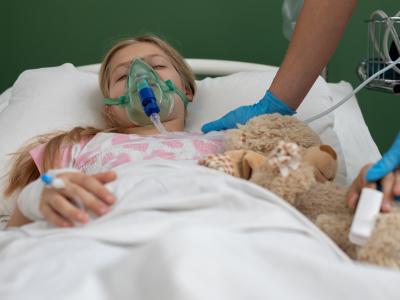Our weekly wrap-up of antimicrobial stewardship & antimicrobial resistance scans
Public-private partnership aims to boost AMR surveillance in Africa
Originally published by CIDRAP News Jun 25
Pfizer and Wellcome Trust yesterday announced a new partnership with the governments of Kenya, Malawi, Ghana, and Uganda to track antimicrobial resistance (AMR) in those countries.
The Surveillance Partnership to Improve Data for Action on Antimicrobial Resistance (SPIDAAR) is a multi-year, public-private collaboration that will provide governments and health officials in the four countries with comprehensive data on AMR patterns and the burden of drug-resistant infections on patients.
Planning for the SPIDAAR began in 2019 with teams identifying health facilities in the four countries. The next phase will initiate surveillance programs at the selected facilities. The program will include a separate, prospective real-world data study to assess AMR rates in each country and the clinical costs of hospital-acquired infections.
"Drug-resistant infections are a huge global health threat, undermining advances in medicine and reversing health progress in countries like Ghana, Kenya, Malawi, and Uganda over the last 20 years," Gemma Buckland Merrett, PhD, Wellcome's science lead for drug-resistant infections, said in a Pfizer press release. "Only through effective surveillance in hospitals and all healthcare settings can we gather the information essential to understand and track these dangerous infections, stop the spread, and protect patients."
Program data will be made available on Pfizer's Antimicrobial Testing Leadership and Surveillance (ATLAS) platform and Wellcome's AMR Register.
Jun 24 Pfizer press release
AMR stable, antibiotic use down in the Netherlands, new report finds
Originally published by CIDRAP News Jun 25
A report today from Dutch health officials indicates that AMR patterns in the Netherlands remained stable in 2019 and that primary care physicians and veterinarians are prescribing fewer antibiotics.
The NethMap 2020 report shows that for most antibiotics, there have been very few statistically significant and clinically relevant shifts in resistance levels since 2015, both in general practices (GPs) and hospitals in the Netherlands. Most notably, the percentage of highly resistant microorganisms (HRMOs) and multidrug-resistance in Enterobacteriaceae remained stable in both settings, at less than 5% in GPs and less than 10% in hospitals. Among specific pathogens, vancomycin-resistant Enterococcus prevalence (less than 1%) and methicillin-resistant Staphylococcus aureus prevalence (less than 2%) remained low.
"For now, the data on resistance look encouraging," the authors of the report wrote.
Total systemic antibiotic use in outpatients also fell slightly, dropping to 8.68 defined daily doses (DDD) per 1,000 inhabitant days. Inpatient use increased to 90.7 when expressed as DDD/100 patient-days but remained stable at 339.7 when expressed as DDD/100 admissions. In veterinary medicine, sales of antibiotics fell by 16.1% compared with 2018 and by 70% compared with the index year 2009.
AMR in the various animal husbandry sectors also remained stable or decreased slightly, with the percentage of extended-spectrum beta lactamase-producing bacteria declining in all sectors, most dramatically in broiler chickens and chicken meat.
"In recent years, extra measures have been taken in the Netherlands to combat antibiotic resistance," the authors said. "These measures extend beyond the healthcare system because resistant bacteria also occur in animals, in foodstuffs and in the environment. That is why a 'One Health' approach is used in the Netherlands."
Jun 25 NethMap 2020 report
Rapid blood culture test tied to improved antibiotic therapy at children's hospital
Originally published by CIDRAP News Jun 23
The implementation of a rapid diagnostic testing platform at a children's hospital, coupled with real-time antibiotic stewardship program (ASP) result notification, was associated with improved antibiotic management of hospitalized children with gram-positive blood culture isolates, researchers reported today in Infection Control and Hospital Epidemiology.
For the study, researchers with the University of Michigan, the Perelman School of Medicine at the University of Pennsylvania, and Children's Hospital of Philadelphia (CHOP) looked at patients aged 0 to 21 admitted to CHOP with positive blood culture events 1 year before and 1 year after the implementation of the Verigene gram-positive blood culture test (BC-GP) with ASP support. BC-GP is a multiplex nucleic acid test that detects nine species and three genera of gram-positive bacteria, plus three genetic resistance determinants. Prior to the intervention, blood culture isolates were evaluated by conventional identification and susceptibility testing methods.
The primary outcome of the study was time to optimal antibiotic therapy for positive blood cultures before and after the intervention. Secondary outcomes included time to effective therapy, time to definitive therapy, time to stopping vancomycin, length of stay, and 30-day mortality. Time to therapy outcomes were compared using Cox regression models and interrupted time series analyses.
A total of 264 blood-culture events (191 gram-positive, 73 gram-negative) occurred before the intervention and 257 (168 gram-positive, 89 gram-negative) occurred after. The median age of patients was 2.9 years, and 418 patients had more than one complex chronic condition. For gram-positive isolates, implementation of BC-GP testing was associated with an immediate reduction in time to optimal therapy and time to stopping vancomycin in both analyses. BC-GP testing was also associated with decreased time to definitive therapy in the interrupted time series analysis, but not in the Cox regression models.
No changes in time to effective therapy, length of stay, or 30-day mortality were associated with BC-GP testing, and the intervention was not associated with any impact on outcomes for gram-negative infections.
"BC-GP could be an important tool for microbiology laboratories and ASPs in ongoing efforts to optimize antibiotic management for children with positive blood cultures," the authors concluded.
Jun 23 Infect Control Hosp Epidemiol abstract
CARB-X funds development of polymyxin-replacing antibiotic class
Originally published by CIDRAP News Jun 23
CARB-X announced yesterday that it will award up to $3.83 million to the University of Queensland's Institute for Molecular Bioscience to develop a new class of antibiotics to replace polymyxins as a last-resort option against multidrug-resistant infections.
Researchers at the institute are working to develop a class of antibiotics based on Octapeptin cyclic peptides that maintain their antibacterial potency against polymyxin-resistant gram-negative pathogens, but with fewer side effects than polymyxins, which can cause severe kidney and neurologic side effects. The peptides will be developed to treat a range of serious bacterial infections, including urinary tract and intra-abdominal infections and pneumonia.
"In our hospitals today, patients are being treated with last-resort antibiotics that can cause damaging side effects, and in some cases, do not even cure the infection," CARB-X chief of research and development Erin Duffy, PhD, said in a press release. "We are in a race against superbugs, and if the University of Queensland project is successful, it has the potential to treat drug-resistant infections safely and effectively, and to save lives."
The project will be eligible for an additional $7.03 million if it meets certain development milestones.
This is the first CARB-X (the Combating Antibiotic Resistant Bacteria Biopharmaceutical Accelerator) award to an academic institution, and the first to an entity in Australia.
Jun 22 CARB-X press release
CARB-X to fund topical antibiotic for surgical, wound infections
Originally published by CIDRAP News Jun 22
CARB-X today announced $4.6 million in funding to expand development of two topical antimicrobial products that target serious surgical and traumatic wound infections.
The money, awarded to Amicrobe, Inc. of Carlsbad, California, will help accelerate development of Amicidin-β Solution, a bioengineered topical antimicrobial designed for direct application to contaminated and infected tissues in surgical and emergency settings.
CARB-X previously awarded the company $6.2 million to support the development of Amicidin-β Solution through a phase 1 clinical trial.
Amicrobe will use $1.84 million of the award to develop Amicidin-β/EF (extended formulation), a version of the product that could be used in developing countries where cold storage systems aren't always available for healthcare products. Company officials say the solution could be used to help prevent infections that develop after caesarean delivery, which represents more than 50% of surgical procedures in sub-Saharan Africa.
"The threat of antimicrobial resistance challenges all of us to bring forward new technologies and innovative products to prevent and treat life-threatening infections," Amicrobe CEO and CSO Michael Bevilacqua, MD, PhD, said in a CARB-X press release. "Amicrobe is grateful to CARB-X and its funding partners for enabling the advancement of our Amicidin-β programs, which we believe have the potential to save lives and curb the spread of drug-resistant bacteria in our own communities and around the world," he said.
Funding for Amicidin-β/EF is made possible by the UK Department of Health and Social Care's Global Antimicrobial Resistance Innovation Fund, a CARB-X partner.
Jun 22 CARB-X press release
Survey: Primary care physicians worry about antibiotic use, but not in their practice
Originally published by CIDRAP News Jun 22
A survey of internal, family, and pediatric medicine physicians in the United States revealed that while most agree that antibiotic resistance and inappropriate antibiotic prescribing are problems in US outpatient settings, far fewer see it as a problem in their practice, researchers reported last week in Open Forum Infectious Diseases.
The 20-minute online survey, which was developed by researchers from the Pew Charitable Trusts, asked about respondents' knowledge, attitudes, and perceptions around antibiotic resistance and prescribing, as well as their support for antibiotic stewardship implementation in their practices. The idea was to identify strategies for tailoring effective interventions and barriers to stewardship uptake. From August 2018 through October 2018, nearly 13,000 primary care physicians received invitations to participate in the survey, and 1,500 responded.
Nearly all respondents (94%) agreed that antibiotic resistance is a problem in the United States, and 73% ranked it within their top three public health issues behind obesity and vaccine hesitancy.
Also, 65% of respondents said they had seen an increase in resistant infections among their patients. But only 55% agreed that antibiotic resistance was a problem in their practice. When it came to antibiotic prescribing, 91% said that inappropriate prescribing was a problem, but only 37% said it was a problem in their practice, and 60% agreed that they prescribed antibiotics more appropriately than their peers.
On the issue of stewardship, 91% of respondents indicated they believed that stewardship programs were appropriate for office-based medical practices, with many respondents saying patients and families should be the primary focus of stewardship efforts. Slightly less than half (47%) said they would need a lot of help to implement stewardship efforts within their practices, and 50% said tracking antibiotic use would be difficult to accomplish.
The activities with the strongest likelihood of spurring stewardship adoption included state departments of health publishing reports on local antibiotic resistance patterns and a public or private payer creating a stand-alone quality incentive program on antibiotic stewardship.
The authors of the study said the results are consistent with previous studies that have found high levels of awareness among clinicians of antibiotic resistance and less recognition of it as a problem in their own practice.
"This lack of recognition of physicians' own contributions to inappropriate prescribing presents a barrier to encouraging widespread stewardship uptake," they wrote.
Jun 20 Open Forum Infect Dis abstract











